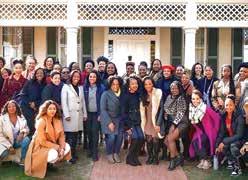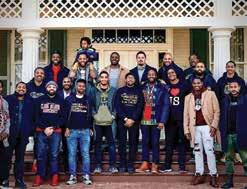
7 minute read
Education
As School Year Winds Down, Teachers Maintain Mutual Support
Sam P.K. Collins WI Staff Writer
With the end of the school year just weeks away, many District teachers continue to reflect on an academic year that has tested their resolve and intensified conversation about the institutional support needed for those entering the classroom in a post-pandemic world.
At Barnard Elementary School in Northwest, teachers with less than five years of experience received mentorship and classroom supplies from members of the District of Columbia State Organization, Alpha Chapter of Delta Kappa Gamma Society International – an organization dedicated to fostering the professional growth of female educators.
Sharon McCrea, a teacher at Barnard a member of Delta Kappa Gamma Society who died in January, played an integral role in connecting the two entities. During a recent award ceremony, Delta Kappa Gamma Society honored McCrea’s memory and highlighted the achievements of several early career educators.
Natasha Swinson, a Pre-K4 teacher who’s been teaching for four years, counted among those recognized on May 6 during the culmination of Teacher Appreciation Week. After spending half of her career in a pandemic, Swinson said she has developed a deeper appreciation for her students.
“Delta Kappa Gamma has helped a lot as a support system and DC Public Schools is helping in the way they can but there’s still a lot on teachers’ plates,” Swinson said. “It’s hard to navigate the moving parts when we haven’t been through this before. In September, we were losing our minds. Teachers are dropping like flies, so making it to the end of the school year feels great.”
ADDRESSING TEACHER BURNOUT WITH A NEW MINDSET
Teacher Appreciation Week, which took place between May 2 and May 6, afforded teachers, administrators and staff members at District public and public charter schools the opportunity to celebrate colleagues who navigated COVID safety protocols, tackled learning loss and wrestled with sentiments that their voices had not been heard.
On the evening of May 3, while the Office of the State Superintendent of Education honored 27 teachers at Gallaudet University’s Kellogg Conference Center in Northeast, District educator Teresa Lasley hosted an event at My Cake Theory in Southeast. During the event, she uplifted teachers and fostered discussion about how they could move forward in a career field that hasn’t adjusted to meet their evolving needs.
As the founder of Instructional Gym, Lasley has spent three years creating spaces for teachers to collaborate, highlight their experiences and develop effective instructional models. Lasley has also focused on teacher burnout by supporting teachers so they can better understand their purpose.
She plans to launch a program in the fall that will assist teachers in choosing an academic environment that can suit their needs and help them thrive in their profession. She said it reflects a change in the tide where many teachers are prioritizing their wellbeing.
“A lot of teachers are in buildings that don’t align to their values and it becomes toxic when you’re at odds with the culture of the building and the structure of how things are
TEACHERS Page 39
5 Pech Chhun, Pealine Humbles, Shaynita Blanchard, Dr. Judith Kelly and Geraldine Meredith at Barnard Elementary School in Northwest on May 6. (Photo courtesy Griselda Rutherford)

Black DMV Homeowners Ban Together; Build Equity Through ‘Ownership Matters’ Group
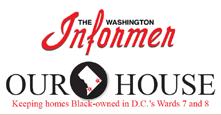
Aja Beckham WI Contributing Writer
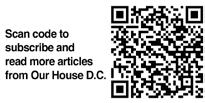
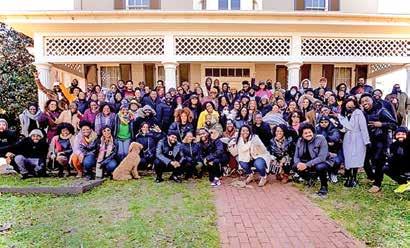
Ownership Matters, a collective for Black homeowners in the D.C. area, gather for photos each year on Juneteenth in front of Fredrick Douglass’s historic home in Southeast.
“About 150 folks came together in front of Fredrick Douglass’ house [to] take a big group photo,” said Gregory Jackson, founder of Ownership Matters, referring to a celebration which started before the pandemic and continues for its fourth year. “We created a space for people to network, and we all went out to brunch to take the community from the virtual to the real world. When COVID hit, a lot of the in-person stuff we had planned was derailed.”
Ownership Matters, based in the District since 2018, builds a community of Black homeowners, landowners and business owners across the U.S, sharing lessons, challenges and resources through virtual platforms including GroupMe, Clubhouse and Instagram.
While the group intended to host in-person gatherings, it pivoted to virtual spaces during the pandemic, reaching 1,200 Black DMV homeowners via GroupMe and 70,000 current or aspiring property and business owners nationwide on Clubhouse. Some virtual offerings have included: ‘Becoming Debt Free,’ ‘House Versus Condo: Pros and Cons’ and for prospective homeowners, ‘Buying Your First Home.’
The homeownership rate for Blacks in the District stands at 34% compared to nearly 49% for whites, according to a US Census 2019 American Community Survey. Ownership Matters wants to reduce the percentage gap between the two groups by increasing the number of Black homeowners.
Their mission statement reads as follows: We’re committed to building a community of property and business owners across the world through education, counseling, facilitating networking, referring professionals for services, and sharing financial resources and grants for aspiring homeowners.
In 2018, Jackson started a group chat with about 20 friends during which they encouraged one another to build wealth and thrive through homeownership. Now there are a lot more chat users – mostly made up of a cadre of millennials averaging 30 years of age.
Some serve as the first in their family to own property. Others, while not the first, often rely on the platform for referrals to either renovate or repair their homes.
In 2020, Alexis White, 26, began the homebuying process for a multi-family property valued at $750,0000 in Brookland. She joined Ownership Matters in 2022. Prior to Ownership Matters, she received guidance on the homebuying process from Neighborhood Assistance Corporation of America.
She said GroupMe helped her become financially-savvy by learning about equity loans and business credit cards – instead of investing with personal savings and credit cards, proper D.C. licensing to boost her income by renting via Airbnb and city-funded grants. In March, Mayor Muriel Bowser announced the Residential Accessory Apartments Program, an affordable housing effort for District homeowners of single-family, semi-detached, or rowhouses who can receive
up to $75,000 if their accessory apartment is approved. When White heard about the program, she reached out to the Ownership Matters’ GroupMe to ask for a referral to connect with a structural engineer, as she had noticed a slight crack in the basement wall – the area which she plans to turn into an accessory dwelling unit that meets the program’s standards. The engineer recommended adding a pillar in the basement to strengthen the structural integrity. Before joining the chat, she recalled hours of research and creating Excel spreadsheets to compare the prices, availability and average review rating. “There's a lot of research that I did that I wouldn’t have had to do had I known someone who had already walked through the process,” White said. She represents the second in her family to own property. In 2021, her 68-year-old grandmother became the first 5 Ownership Matters, a collective for Black homeowners in the D.C. area, gather for an an- homeowner in the family after moving from a $1,500 rental nual photoshoot in front of Fredrick Douglass’s historic Southeast D.C. home every Juneteenth. property in Oxon Hill, Maryland to a house in Waldorf, Maryland where she pays a $800 monthly mortgage payment. White’s brother recently became the third property owner in the family after purchasing an entire block in Richmond, Virginia, where he will build apartment housing for college students. Now, White’s helping her mother become a homeowner. “My mom’s never made more than minimum wage. I’m going to be honest, she’s never been able to afford a home,” White said. “Now, I'm in the process of trying to get her into Home Purchase Assistance, [a] first-time homebuyers program in D.C. They provide the closing cost and down payment.” Similar financial challenges remain consistent for many Black residents in D.C. The average Black household income in D.C. could afford just 8.4% of District homes sold between 2016 and 2020; while the average white 5 While the group intended for in-person gatherings, household could afford 71 percent of it pivoted to virtual spaces during the pandemic. Ownership Matters reaches 1,200 Black DMV homeowners via GroupMe and 70,000 nationwide members via Clubhouse. the same homes, according to the Urban Institute. In an effort to include everyone in the homeownership conversation, Jackson is planning an Ownercon Conference in late June 2022. The intended audience includes: those seeking to buy their first home or another property, real-estate professionals, interior and exterior designers, developers, government agencies such as D.C. Office of Planning. Panels and logistics are still in the planning phase. “I think it's important for homeowners of today to be the millionaires and billionaires of tomorrow,” Jackson said. “Hopefully, [we] will inspire folks to think ahead and start to figure out if they want to buy a property and how they can invest in the future of the city.”
